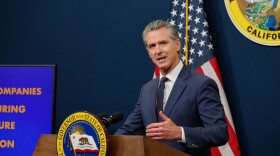President Bush's budget for the upcoming fiscal year marks a change in the way the federal government supports scientific and medical research. For the first time in decades, funding for the National Institutes of Health would decrease. New scientists depend on grants from the NIH for their research, and the cuts mean most who apply would be turned down. Veteran scientists say the possible effects on future scientific and medical breakthroughs could be devastating. KPBS reporter Beth Ford Roth has the story.
Neurobiologist Lisa Boulanger is what you might call a new scientist. She's spent years getting her Phd and worked as a post-doc, which like an apprentice. She's now in charge of her own lab at UCSD.
Boulanger and her graduate students do research here on autism and schizophrenia research that could one day lead to treatments for these conditions.
Boulanger: I think we have the potential to help people biomedically, to help lots and lots of them instead of one at a time personally, maybe we can help, you know, all the people who have schizophrenia, if we're lucky, if we're very, very lucky.
Grants from the National Institutes of Health have been the core source of funding for up-and-coming scientists like Boulanger. In fact, she's planning to apply for its main grant, the RO1, in June. But she knows her chances of getting the grant are much slimmer than they used to be.
Boulanger says it's a dire situation, not just for her, but the next generation of scientists. She says she's now in the position of mentoring post-docs and grad students. They see her constantly applying for small grants to keep her lab running in case the RO1 doesn't come through.
Boulanger: and they see that you're stressed out about raising money, and they don't see that as a lifestyle that they really want, and I see often that the smart people who are really savvy think I'm smart, I could do lots of different things, why do this thing that's perpetually terrifying, that means very often, you'll be on the edge of losing your livelihood, why not go for something more stable?
On the other end of the spectrum of experience is Dr. Stuart Lipton. He's a veteran of the scientific world. Lipton is the scientific director of the Burnham Institute for Medical Research. He's also a neurologist at UCSD, and a professor at both the Scripps Research Institute and the Salk Institute, all in La Jolla.
Lipton says he doesn't have to constantly scramble for grants. But he's worried just the same. He says the decrease in funding to the NIH means nine out of ten new scientists who apply for the RO1 grant will get turned down. He says the United States could loose a whole generation of scientists to better paying private industries or to other countries that better fund scientific research.
Lipton: That would be a real travesty looking fifteen or twenty years down the road, because without the scientific minds, you know that's what we as United States citizens have, we have ourselves, we have fantastic minds that come from all over the world, if we deter them and tell them they can't do that, you know, that's the end of our cause as we know it.
Data put out by the White House claims the budget increases NIH funding, from $21.1-billion in 2006, to $22.8 billion next year.
But analysis by the American Association for the Advancement of Science disputes that. When inflation is taking into account, Research and Development funding for the NIH will actually level off next year, and plummet 12-percent by 2011.
Lipton says this will be detrimental to the future discovery of new drugs and treatments for disease, because the research that produces such breakthroughs won't be funded. He says public grants allow scientists to be motivated by a pure love of discovery.
Lipton: You know, pharmaceutical companies are very important, they produce some fantastic new drugs, but they have other motives, and I think in academic medicine we're really free to follow our noses, and I think the public wants that, you don't want someone who's solely motivated by the dollar, no matter how nice they are, you really want science for the sake of science, cause many big discoveries that end up producing new drugs.
Lipton says it's an exciting time to be a scientist. New fields like stem cell research and genomics are ripe with possibility for human healing. But he wonders how many discoveries might be missed, because the government's funding cuts may force too many scientists out of the field. Beth Ford Roth, KPBS News.





